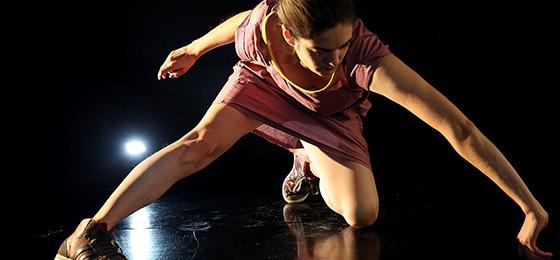Scientists turn actor in the play "Blue Butterfly"

In the play "Blue Butterfly", scientists turn actor to overturn clichés about themselves and their colleagues. The play is funded by the SNSF's Agora scheme.
"The Catalyst", a theatre collective whose members are scientists and artists, has set itself the goal of presenting to the public a true-to-life picture of researchers. The clichéed image of scientists as recluses who spend all day and night holed up in laboratories and garrets poring over grandiose ideas and who have no interests outside their field still has a certain currency among the public. In this play, the scientists turn actor in a bid to overcome such prejudices while simultaneously giving audiences a comprehensible insight into the mindsets and concepts that underlie science.
Mystical beliefs in a family of researchers
"Blue Butterfly" is the story of a young family with an unusual child. Scientists Natalie and Simon are endeavouring to make their ideas on cancer research, immunology and parasitism accessible to the general public. Their everyday life consists of their efforts to reconcile the hugely different roles of parents, scientists, entertainers and sceptics. This inevitably results in difficulties and compromises that are reflected in their relationship with the seven-year-old daughter Pearl. While her parents are trying to thrust their research into the limelight, Pearl becomes withdrawn and finds herself gravitating towards her grandmother's mystical beliefs.
The play is funded by the SNSF's Agora scheme, which promotes dialogue between researchers and the public. The play was written by British dramatist Richard Crane with the scientists and artists in "The Catalyst" and directed by Ailin Conant of London-based Theatre Témoin. "Blue Butterfly" is suitable for children aged 13 or over.
Scientists initiate dialogue with the public
The performances on 2 May in Geneva and 10 May in Lausanne will be followed by discussion sessions between the members of "The Catalyst" and the audience. Combining art with science makes for a refreshing mixture that is intended to appeal on the one hand to people who would otherwise have virtually no contact with classical theatre, and on the other to those would normally have nothing to do with science. The project also gives researchers an opportunity to explore the medium of theatre. Although the format may be unconventional for scientists, it enables them to present their work to the public and let their audiences share their enthusiasm for what they do.
Opening date: 29 April 2015Last performance: 2 May 2015 – after the performance, the acting scientists take part in a question and answer session with the audienceVenue: Théâtre PITOËFF, Geneva, WED/THU/FRI 20:00 / SAT 17:00
***
Opening date: 8 May 2015Last performance: 10 May 2015 – after the performance, the acting scientists take part in a question and answer session with the audienceVenue: Théâtre LA GRANGE DE DORIGNY, Lausanne University, FRI/SAT 20:00 / SUN 19:00